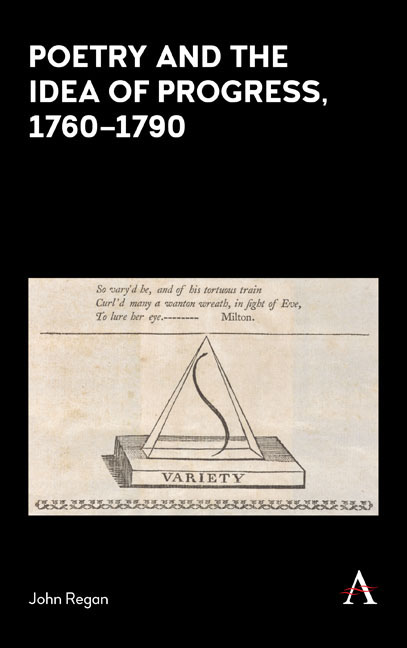Book contents
- Frontmatter
- Contents
- List of Figures
- Acknowledgements
- Introduction
- 1 Progress by Prescription
- 2 Thomas Sheridan and the Divine Harmony of Progress
- 3 ‘There Is a Natural Propensity in the Human Mind to Apply Number and Measure to Every Thing We Hear’: Monboddo, Steele and Prosody as Rhythm
- 4 ‘[C]ut into, distorted, twisted’: Thomas Percy, Editing and the Idea of Progress
- 5 ‘Manners’ and ‘Marked Prosody’: Hugh Blair and Henry Home, Lord Kames
- Afterword: Rude Manners, ‘Stately’ Measures: Byron and the Idea of Progress in the New Century
- Conclusion
- Notes
- Bibliography
- Index
- Frontmatter
- Contents
- List of Figures
- Acknowledgements
- Introduction
- 1 Progress by Prescription
- 2 Thomas Sheridan and the Divine Harmony of Progress
- 3 ‘There Is a Natural Propensity in the Human Mind to Apply Number and Measure to Every Thing We Hear’: Monboddo, Steele and Prosody as Rhythm
- 4 ‘[C]ut into, distorted, twisted’: Thomas Percy, Editing and the Idea of Progress
- 5 ‘Manners’ and ‘Marked Prosody’: Hugh Blair and Henry Home, Lord Kames
- Afterword: Rude Manners, ‘Stately’ Measures: Byron and the Idea of Progress in the New Century
- Conclusion
- Notes
- Bibliography
- Index
Summary
With its emphases on prosody and diachronic ideas of human development, this book is likely to be read in the context of the fairly recently minted school of literary criticism known as Historical Poetics. Some understanding of this school's putative positions, and objections to these, are effective ways into reflecting on the relationships between poetry and the idea of progress described here.
In a 2016 article entitled ‘What Is Historical Poetics?’ Yopie Prins sets out first to clarify, and secondly to defend, some of the school's foundational positions. She has been provoked into doing so by Simon Jarvis's objection that while historical poetics ostensibly eschews any single type of address to verse, it nonetheless appears in the majority of cases to be concerned with traditions of thinking that do not pay adequate attention to the techniques of verse composition. In a sense Jarvis's objection only says back to historical poetics what historical poetics had already said about itself. In an initial announcement for a conference entitled ‘Poetic Genre and Social Imagination: Pope to Swinburne’ at the University of Chicago in 2014, the dual concerns of the school are set out:
Scholars of English and American poetry have recently called for a new historical poetics capable of analyzing relations between culture and poetic form (including meter and rhyme as well as specific verse forms)’ and suggested that ‘two approaches have dominated this conversation. The first recovers lost ways of thinking about form – in prosody manuals, recorded performance, private correspondence, newspaper reviews, and so on – and reads them back into cultural history. The second historicizes poems from the inside out, making evident social affinities and antagonisms in literary form by comparative description.
In this bifurcating view, ‘out to in’ reading uses ‘thinking about form – in prosody manuals, recorded performance, private correspondence, newspaper reviews’ to understand the historicity of poems. This seemingly innocuous summation contains what is for Jarvis an intractable problem. Historical poetics is principally concerned with describing historical traditions of thought which – while they perhaps conditioned readers in a given poem's time and, while arguably they should contextualize twentyfirst-century readers’ appreciation of historical poetry – either happen in prose or pay little attention to the particular technical work that constitutes writing in metrical or ‘numbered’ language.
- Type
- Chapter
- Information
- Poetry and the Idea of Progress, 1760 , pp. 157 - 166Publisher: Anthem PressPrint publication year: 2018



